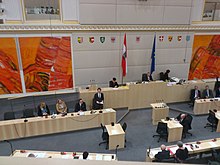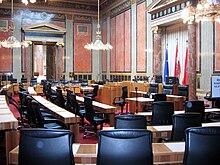Federal Council (Austria)
| Federal Council | |
|---|---|
| Parliament logo | |

|
|
| position | Federal legislative body (Chamber of Parliament ) |
| State authority | legislative branch |
| founding | October 1, 1920 (Austrian Federal Constitutional Law ; first meeting November 10, 1920) |
| Seat | Hofburg, Vienna (provisional) |
| Chair |
President of the Federal Council : Andrea Eder-Gitschthaler (ÖVP) |
| Guarantee of existence | Art. 44 para. 3 (federal principle) B-VG |
| Website | www.parlament.gv.at |
The Federal Council is in Austria next to the National Council , the second chamber of the Austrian parliament . It is the representative body of the federal states at federal level. The chairman of the Federal Council as President of the Bundesrat referred. The mandataries bear the title of member of the Federal Council , but the terms Federal Councilor are also common.
The parliament building has been completely renovated since July 13, 2017. That is why the National Council and the Federal Council have been meeting in the alternative quarter, the Vienna Hofburg, since September 20, 2017.
tasks

In political practice, the Federal Council in Austria very little influence, as it in most cases against the National Council only a suspensive (suspensive d. H.) Veto has that the National Council through a resolution passed by a simple majority steady decision can be overridden. So he can only postpone laws - with a few exceptions.
The Federal Council has a right of consent in the following cases:
- Constitutional laws and regulations that limit the competences of the federal states: two-thirds majority required if half of the members are present, Art. 44, Paragraph 2 of the Federal Constitutional Act (B-VG)
- legal provisions that affect the rights of the Federal Council itself
- State treaties that regulate matters of the independent sphere of activity of the federal states: unconditional majority required, Art. 50 para. 4 B-VG
Constitutional laws and provisions that amend Article 34 or 35 of the Federal Constitutional Law also require a majority of the representatives of at least four states in the Federal Council in accordance with Article 35, Paragraph 4 of the Federal Constitution.
In some matters (e.g. transferring tasks from the indirect federal administration to the direct federal administration or changing the state borders) the states also participate directly in the federal legislative process .
In the case of constitutional changes , a referendum must also be held if a third of the members of the Federal Council so request.
According to Art. 42 para. 5 B-VG, the Federal Council has no right of participation in laws that concern one of the following points:
- Amendment of the National Council's rules of procedure
- Dissolution of the National Council (early termination of the legislative period )
- Financial legislation (regarding the federal budget, etc.)
In contrast to the situation in the German Bundesrat , the Austrian Bundesrat has a free mandate . Each member of the Federal Council can vote freely, there is no compulsion to vote in parliamentary groups or state blocs.
composition
The number of members per federal state is determined in accordance with Art. 34 of the Federal Constitutional Act by resolution of the Federal President after each general census according to the ratio of the number of resident citizens of the federal states to one another; the country with the largest number of resident citizens has twelve seats, but each country has at least three. In 1993 a total of 65 members were appointed, in 2002 there were 62, and the Federal Council has currently had 61 members since August 12, 2013.
The individual Federal Councilors are delegated to the Federal Council by the respective Landtag and roughly reflect the composition of the respective Landtag. The second largest party in the respective state parliament has at least one member. Otherwise the appointment is made by proportional representation . The members of the Federal Council are elected for the duration of the legislative period of the respective Landtag. They do not have to be members of the respective state parliament, but must be eligible for election.
Unlike in the German Bundesrat , the members of the Bundesrat are not bound by instructions from the respective Landtag or the respective Land government ( free mandate ). They enjoy the immunity granted to them by the respective state parliament. The President of the Federal Council, every six months, is made up of the strongest parliamentary group in a federal state. The change of chairmanship takes place alphabetically by federal state and correlates with that in the state governors' conference .
Composition according to parties

Federal councilors elected by the state parliaments on the basis of proposals from the same party have the right to form a parliamentary group. A parliamentary group is basically made up of five federal councilors (a smaller number of federal councilors can only join a parliamentary group with the consent of the federal council). At the moment there are parliamentary groups from ÖVP, SPÖ, FPÖ and the Greens in the Federal Council.
The Federal Council is currently composed of the following groups:
| country | total | ÖVP | SPÖ | FPÖ | Green |
|---|---|---|---|---|---|
|
|
3 | 1 | 2 | - | - |
|
|
4th | - | 3 | 1 | - |
|
|
12 | 7th | 3 | 2 | - |
|
|
10 | 4th | 2 | 3 | 1 |
|
|
4th | 2 | 1 | 1 | - |
|
|
9 | 4th | 2 | 2 | 1 |
|
|
5 | 3 | 1 | 1 | - |
|
|
3 | 2 | - | - | 1 |
|
|
11 | - | 6th | 4th | 1 |
| Together | 61 | 23 | 20th | 14th | 4th |
- As of December 17, 2019
criticism
The usefulness of the Federal Council is controversial. Various political voices (especially from the federal states) want the Bundesrat to be upgraded, while others want it to be abolished. Critics have said that the Federal Council is being abused by the parties as a political cadre forge to enable young politicians to make their first contact with federal politics. It also serves to "praise" unloved veteran members of the National Council.
The usefulness of a two-chamber system in a country the size of Austria has been questioned by some political scientists . Some comparable countries such as Sweden , Norway or Denmark often only have a unicameral parliament .
As an argument in favor of retaining the Bundesrat, it has been argued that bicameral systems are characteristic of federal states because the federal states have a say in federal legislation through the Bundesrat and thus have a certain influence. If the Federal Council were to be abolished without replacement, it would be an overall amendment to the Federal Constitution , which can only be implemented with a qualified majority in the National Council and a binding referendum (Art. 44 Para. 3 B-VG).
In February 2019, the Federal Council prevented a law from being passed for the first time in its history. An amendment to the Green Electricity Act was rejected, and all 21 SPÖ MPs voted against it. This rejection was possible because the law to be voted on would have restricted the powers of the federal states.
See also
Web links
- Parliament declares: Federal Council
- Who is who: Federal Council (personal details)
- Three-dimensional view of the boardroom
Individual evidence
- ↑ Last meeting in the old plenary hall - wien.ORF.at. Retrieved July 15, 2017 .
- ↑ www.parlament.gv.at: overview page and list of links on the redevelopment (accessed on December 17, 2019)
- ↑ Federal Law Gazette I No. 1/1920 p. 6
- ↑ Federal Law Gazette II No. 237/2013
- ↑ Composition of the Federal Council since 1945 , parlament.gv.at
- ^ Theo Öhlinger, Harald Eberhard: Constitutional Law . 11th edition. facultas, Vienna, ISBN 978-3-7089-1434-3 , pp. 58 .
- ↑ Absolute SPÖ veto: Federal Council brings green electricity amendment down. In: orf.at . February 14, 2019, accessed March 20, 2020 .




